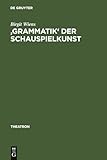'Grammatik' der Schauspielkunst : Die Inszenierung der Geschlechter in Goethes klassischem Theater / Birgit Wiens.
Material type: TextSeries: Theatron : Studien zur Geschichte und Theorie der dramatischen Künste ; 31Publisher: Tübingen : Max Niemeyer Verlag, [2011]Copyright date: ©2000Edition: Reprint 2011Description: 1 online resource (248 p.)Content type:
TextSeries: Theatron : Studien zur Geschichte und Theorie der dramatischen Künste ; 31Publisher: Tübingen : Max Niemeyer Verlag, [2011]Copyright date: ©2000Edition: Reprint 2011Description: 1 online resource (248 p.)Content type: - 9783484660311
- 9783110918687
- 792
- PT2116.W54 2000eb .W54 2000
- online - DeGruyter
- Issued also in print.
| Item type | Current library | Call number | URL | Status | Notes | Barcode | |
|---|---|---|---|---|---|---|---|
 eBook
eBook
|
Biblioteca "Angelicum" Pont. Univ. S.Tommaso d'Aquino Nuvola online | online - DeGruyter (Browse shelf(Opens below)) | Online access | Not for loan (Accesso limitato) | Accesso per gli utenti autorizzati / Access for authorized users | (dgr)9783110918687 |
I-XII -- Einleitung. Theatergeschichte aus 〉weiblicher Sicht〈 – eine Gegen-Geschichte? -- Teil I. Polarisierungen: Der bürgerliche Geschlechterdiskurs und die Entdeckung des weiblichen 〉Mangels〈 – ein Vorspiel -- Teil II. »Anthropomorphism, Erotomorphism«: Zum Verhältnis von Autorfunktion, Sexualität und Sprache im Vorfeld der Weimarer Klassik -- Teil III. Theatrum Eroticum: Geschlechterdifferenz und Schauspieltheorie im Vorfeld der Weimarer Klassik -- Teil IV. Ein Haus aus Sprache – Zur Ordnung des Geschlechts in der »Grammatik« des klassischen Theaters -- Teil V. »Verweile doch, du bist so schön« – (Theater-)Kunst im öffentlichen Raum. Geschlechter-Stilisierung als kulturelle Architextur -- Teil VI. »...Und nun erkennt ein Geister-Meisterstück!« Zur Inszenierung der Geschlechter in Goethes klassischem Theater. Ein Nachspiel -- Bibliographie
restricted access online access with authorization star
http://purl.org/coar/access_right/c_16ec
In der Zeit der Weimarer Klassik hat Goethe nicht nur eine Reihe bis heute zum allgemeinen ›Bildungsgutästhetischen ErziehungGrammatikarchäologischMannFrauGenus-Forschungdekonstruktiven Feminismus‹ leistet die Studie eine Revision der bisher vorliegenden Geschichtsschreibung zu Goethes Theater und stellt zugleich einen neuen methodischen Ansatz theaterhistorischer Forschung vor.
In the period of Weimar Classicism Goethe did not only write a number of plays which to the present day have retained their place in the canon of 'classical' literature forming part of the heritage of the 'educated' classes. From 1797 to 1817 he was director of the Court Theatre in Weimar where he figured as both a drama theoretician and a man of the theatre in an eminently practical sense. The close interactions between drama production, theory, stage practice and the 'aesthetic education' of actors and actresses gave rise to his »Rules for Actors«, a fully organized system of theatrical signs squarely in the tradition of idealist thought and designated by Goethe explicitly as a 'grammar'. The present volume sets out to retrace this semiological process (i.e. the formation of a theatrical language) 'archeologically' and point up its specific historicity. Of central moment are the question of different contemporary definitions of 'man' and 'woman' and their transformation into the semiotic system of Weimar Classicism. From the perspective of gender studies and deconstructive feminism the study essays a revision of existing historiographic approaches to Goethe's theatre and at the same time proposes a new methodological approach to research in the history of theatre.
Issued also in print.
Mode of access: Internet via World Wide Web.
In German.
Description based on online resource; title from PDF title page (publisher's Web site, viewed 28. Feb 2023)


